Exam 1: Functions and Graphs
Exam 1: Functions and Graphs224 Questions
Exam 2: Limits and the Derivative123 Questions
Exam 3: Additional Derivative Topics126 Questions
Exam 4: Graphing and Optimization116 Questions
Exam 5: Integration93 Questions
Exam 6: Additional Integration Topics82 Questions
Exam 7: Multivariable Calculus78 Questions
Exam 8: Trigonometric Functions92 Questions
Exam 9: Differential Equations47 Questions
Exam 10: Taylor Polynomials and Infinite Series48 Questions
Exam 11: Probability and Calculus57 Questions
Exam 12: Basic Algebra Review44 Questions
Exam 13: Special Topics20 Questions
Select questions type
Provide an appropriate response.
-How can the graph of  be obtained from the graph of
be obtained from the graph of 
(Multiple Choice)
4.9/5  (35)
(35)
Solve graphically to two decimal places using a graphing calculator.
-
(Multiple Choice)
4.9/5  (40)
(40)
Write an equation for the lowest-degree polynomial function with the graph and intercepts shown in the figure.
-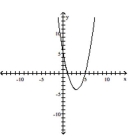
(Multiple Choice)
5.0/5  (34)
(34)
Find the vertex form for the quadratic function. Then find each of the following:
(A) Intercepts
(B) Vertex
(C) Maximum or minimum
(D) Range
-
(Multiple Choice)
4.8/5  (28)
(28)
Determine whether the relation represents a function. If it is a function, state the domain and range.
-
(Multiple Choice)
4.8/5  (33)
(33)
The graph that follows is the graph of a polynomial function. (i) What is the minimum degree of a polynomial function
that could have the graph? (ii) Is the leading coefficient of the polynomial negative or positive?
-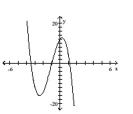
(Multiple Choice)
4.9/5  (37)
(37)
Solve the problem.
-In North America, coyotes are one of the few species with an expanding range. The future population of coyotes in a region of Mississippi valley can be modeled by the equation P = 59 + 12 · ln(18t + 1), where t is time in
Years. Use the equation to determine when the population will reach 170. (Round your answer to the nearest
Tenth year.)
(Multiple Choice)
4.8/5  (41)
(41)
Write an equation of the line with the indicated slope and y intercept.
-
(Multiple Choice)
4.9/5  (39)
(39)
Provide an appropriate response.
-Graph the linear function defined by  and indicate the slope and intercepts.
and indicate the slope and intercepts. 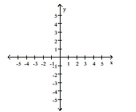
(Multiple Choice)
4.8/5  (37)
(37)
Provide an appropriate response.
-Write the equation of a line that passes through (-1, 4) and (5, -1). Write the final answer in the form Ax + By = C where A, B, and C are integers with no common divisors (other than ±1) and A > 0.
(Multiple Choice)
4.9/5  (27)
(27)
Provide an appropriate response.
-The following graph represents the result of applying a sequence of transformations to the graph of a basic
function. Identify the basic function and describe the transformation(s). Write the equation for the given graph. 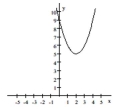
(Essay)
4.8/5  (27)
(27)
Solve the problem.
-Since life expectancy has increased in the last century, the number of Alzheimer's patients has increased dramatically. The number of patients in the United States reached 4 million in 2000. Using data collected since
2000, it has been found that the data can be modeled by the exponential function  x, where
X is the years since 2000. Estimate the Alzheimer's patients in 2025. Round to the nearest tenth.
x, where
X is the years since 2000. Estimate the Alzheimer's patients in 2025. Round to the nearest tenth.
(Multiple Choice)
4.8/5  (36)
(36)
Solve the problem.
-The level of a sound in decibels (db) is determined by the formula N = 10 · log(I × 1012) db, where I is the intensity of the sound in watts per square meter. A certain noise has an intensity of 8.49 × 10-4 watts per square
Meter. What is the sound level of this noise? (Round your answer to the nearest decibel.)
(Multiple Choice)
4.9/5  (35)
(35)
Solve the problem.
-To estimate the ideal minimum weight of a woman in pounds multiply her height in inches by 4 and subtract 130. Let W = the ideal minimum weight and h = height. W is a linear function of h. Find the ideal minimum
Weight of a woman whose height is 62 inches.
(Multiple Choice)
4.7/5  (30)
(30)
Graph the linear equation and determine its slope, if it exists.
-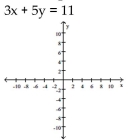
(Multiple Choice)
4.9/5  (39)
(39)
Showing 161 - 180 of 224
Filters
- Essay(0)
- Multiple Choice(0)
- Short Answer(0)
- True False(0)
- Matching(0)